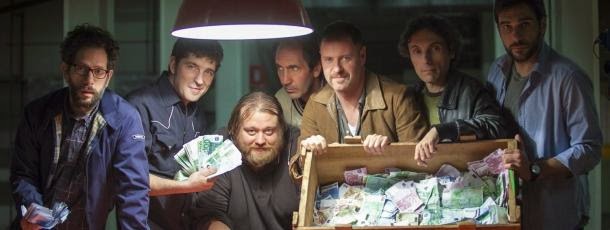Mientras todo el mundo cinéfilo mira con atención y, en algunos casos,
con satisfacción al cine italiano gracias a la película “La Grande Bellezza”,
con particular énfasis a todos los premios que se ha llevado en los últimos
meses, yo prefiero hablaros de una comedia que lleva poco tiempo en la gran
pantalla y que está generando muchos más favores y agradecimientos de público que
el aclamado premio Óscar. El título
en italiano es “Smetto quando voglio”
que en español se podría traducir con “Dejo
cuando quiero” y se trata de una comedia de gran calidad, divertimiento e
ironía, particularidades que me han sorprendido sobre todo porque no soy una
amante de las comedias italianas.
Éste género en este país gira, o por lo menos ha girado casi siempre, alrededor
de sentimientos amorosos con clichés clásicos del macho latino, con una mujer súper
guapa por la que el protagonista pierde la cabeza y desde allí ocurren sucesos hilarantes,
burlescos hasta satíricos a veces. El éxito en estos casos reside casi siempre en
los grandes cómicos que actúan y que afortunadamente resultan ser unos verdaderos
maestros, como Benigni
o Verdone, pero en este caso la situación es diferente: es la historia la
verdadera estrella de esta comedia. Si no fuera/fuese por los diálogos y por
algunos tópicos de la cultura italiana y mediterránea, había seguramente
pensado que podría tratarse de una producción francesa, por los temas muy
actuales y complejos que trata, con aquella agudeza e ironía que hemos vistos
en otras películas como “Intouchables”
o “Bienvenidos al Norte”. Esta vez la
historia de amor, porque está claro que la hay, es secundaria, la problemática
principal es la crisis económica que está atravesando Italia, para no decir
casi toda Europa y muchos otros lugares del mundo. En un país, como España, Grecia o
Portugal, donde invertir dinero en la investigación y en la cultura ya no es
una prioridad para no decir otra cosa más, un grupo de ex investigadores
universitarios sin ninguna oportunidad de seguir con sus estudios y trabajos
eligen aprovechar sus increíbles dotes de inteligencia y preparaciones para involucrarse
en el mundo del marketing ilegal. De hecho, crearan una empresa criminal
de gran éxito aunque no podrán dejar de ser unos simples aficionados en este
peligroso mundo y desde allí empezaran una serie de rocambolescos acontecimientos
que divierten mientras se reflexiona al mismo tiempo.
El director Sydney
Sibilia es a su primer largometraje, una verdadera revelación para el
cine italiano, y junto con los otros dos guionistas Valerio Attanasio y Andrew
Garello, realizan una obra estilo Breaking Bad que por un lado quiere ser una
condena a unas condiciones laborales y sociales generalmente difusas e injustas,
por el otro la ponen en escena de forma original y con un final Hollywoodiense bastante
atípico a lo que estamos acostumbrados a ver en Italia. Además los actores
resultan ser perfectamente identificados en sus personajes, muy bien
caracterizados gracias también a unos verdaderos talentos como Edoardo Leo,
Valerio Aprea, Paolo Calabresi,
etc.
I LEAVE WHEN I WANT TO
While every cinephile looks with attention and,
in some cases, satisfaction at Italian cinema thanks to the film "La Grande Bellezza"
(The Great Beauty) with particular emphasis on all the awards it has received
in recent months; I prefer to speak of a comedy which has been a little time on the big screen by now and that
is generating more favors and public acknowledgments than the acclaimed Oscars Awards. The Italian title
is "Smetto quando voglio"
that could be translated as "I leave when I want to" and it is a
comedy of high quality, amusement and irony, particularities that have
surprised me because I'm not a lover of Italian comedies.
In Italy, this gender has always revolved around love
feelings with classic clichés about Italian males with a super beautiful woman,
who the protagonist is crazy about, and exhilarating events, burlesque
sometimes even satirical. The success in these cases lies mostly in the great
comical actors and who fortunately turn out to be true masters, as Benigni or Verdone,
but in this case the situation is different: the story is the real star of this
comedy. If it wasn’t for the dialogues and some clichés about the Italian and
Mediterranean culture, I would have probably thought it is a French production,
for the very current and complex issues dealing with that wit and irony we've
seen in other movies like "Intouchables"
or "Bienvenue chez les ch'tis". This time the love story, because it is clear
there will be a love story, is secondary; the main issue is the economic crisis
affecting Italy, not to say most of Europe and many other parts of the world. In
a country such as Spain,
Greece and Portugal, where investing money in research and culture is no longer
a priority, a group of former university researchers without any opportunity to
continue their studies, choose to use their amazing feats of intelligence and get
involved in the world of illegal marketing. In fact, they create a criminal
organization of great success although they may no longer be amateurs in this
dangerous world and from there on a series of fanciful fun events begin which
make the audience have fun and think at the same time.
This is the director’s first feature film (Sydney Sibilia), is his
first feature film, a true revelation for Italian cinema, and together with the
other two writers Valerio
Attanasio and Andrew Garello, a work style similar to Breaking Bad: on
one hand wants to be a condemnation of a generally diffuse and unfair labor and
social conditions; on the other they stage with an original form and a Hollywood-end atypical
ending we are not used to see in Italy. Moreover, the actors embody their
characters perfectly, very well characterized thanks to some true talents as
Edoardo Leo, Valerio Aprea, Paolo
Calabresi, etc.
Simona CulturalNet
Translation review: Elvira Salinas






No comments:
Post a Comment